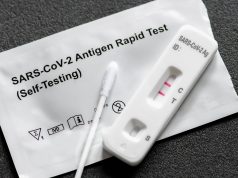In some individuals, there were many viral amino acid substitutions, indicating strong positive selection
By Elana Gotkine HealthDay Reporter
FRIDAY, March 1, 2024 (HealthDay News) — About 0.1 to 0.5 percent of severe acute respiratory syndrome coronavirus 2 (SAS-CoV-2) infections become persistent, lasting for at least 60 days, according to a study published online Feb. 21 in Nature.
Mahan Ghafari, Ph.D., from the University of Oxford in the United Kingdom, and colleagues examined the population prevalence of persistent SARS-CoV-2 infections, their viral load kinetics, and evolutionary dynamics over the course of infections. Overall, 381 individuals with SARS-CoV-2 RNA at high-titer persisting for at least 30 days were identified; of these individuals, 54 had viral RNA persisting for at least 60 days (“persistent infections”).
The researchers found that the odds of self-reporting long COVID were more than 50 percent higher for individuals with persistent infection compared with those with nonpersistent infection. An estimated 0.1 to 0.5 percent of infections may become persistent, lasting for at least 60 days, and with typically rebounding high viral loads. Many viral amino acid substitutions were identified in some patients, indicating periods of strong positive selection, while others had no consensus change in the sequences for prolonged periods, indicating weak selection. These substitutions included lineage-defining mutations for SARS-CoV-2 variants and at target sites for monoclonal antibodies; they were also commonly found in immunocompromised individuals.
“Our observations highlight the continuing importance of community-based genomic surveillance both to monitor the emergence and spread of new variants and to gain a fundamental understanding of the natural history and evolution of novel pathogens and their clinical implications for patients,” the authors write.
Copyright © 2024 HealthDay. All rights reserved.








